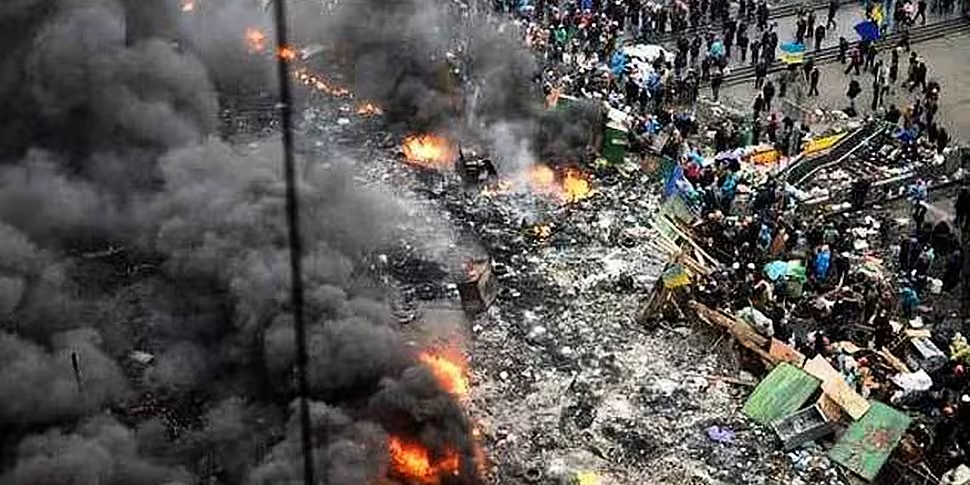A deal to end the crisis in Ukraine has taken a major step forward after protesters agreed to a compromise by the president to form a coalition government.
Opposition leader Oleh Tyahnybok said a council representing protesters in Independence Square backed the deal on condition that the current interior minister and prosecutor-general are excluded from any interim government.
The protesters' refusal to agree had formed the main obstacle in getting the deal signed.
Protesters are spending another evening on the streets - despite a peace deal between opposition leaders and the Ukrainian president.
These Ukrainians explain why they've turned out:
The three opposition leaders - Mr Tyahnybok, Vitali Klitschko and Arseniy Yatsenyuk - met with President Viktor Yanukovych at the presidential HQ in Kiev to sign the deal.
The Ukrainian President has revealed details of a deal agreed with opposition leaders to end the crisis which has seen dozens killed and hundreds injured.
In a statement on his website, Viktor Yanukovych announced Presidential elections will take place early in December this year and promised to form a coalition government.
He also promised constitutional reforms which will trim presidential powers - one of the the key demands by protesters.
European Union Ministers have been trying to broker a political settlement in Ukraine after gun battles between police and anti-government protesters brought the death toll to 77 in two days.
President Viktor Yanukovych has reportedly agreed to form a coalition government
The officials from Germany, France and Poland, embarked on "a night of difficult negotiations" with President Yanukovych and the opposition.
It comes as violence flared again with reports of gunfire in the capital on Friday morning. Ukrainian police claimed protesters had opened fire on officers near Independence Square and they had returned fire.
A police statement said "Participants in the mass disorder opened fire on police officers and tried to burst through in the direction of the parliament building."
Armed police entered the parliament building while politicians were holding an emergency session but were forced out, according to opposition leader Arseny Yatsenyuk.
MPs then exchanged punches when speaker Volodymyr Rybak tried to adjourn the proceedings. Opposition and EU ministers have not confirmed the agreement.
This picture shows a 'before & after' shot of Kiev's Independece Square
The French Foreign Minister Laurent Fabius said "The opposition wants to consult with some of its members, which is entirely understandable. In this sort of situation, as long as things haven't really been wrapped up, it's important to remain very cautious."
On Thursday, the Ukrainian Parliament passed a measure that would prohibit an "anti-terrorist operation" threatened by Mr. Yanukovych to restore order and called for all interior ministry troops to return to their bases.
EU Foreign Ministers meeting in Brussels have agreed to impose sanctions on officials held responsible for the violence, including a travel ban and asset freeze on close allies of Mr Yanukovych.
It comes as Standard & Poor's rating agency lowered Ukraine's long-term rating a notch to "CCC", saying the political crisis has put the government's ability to service its debt at risk and raised uncertainty over Russia providing promised aid.
US President Barack Obama is considering a range of sanctions although no details have been given on what options were being discussed.
The protests started last November over Mr Yanukovych's decision to have closer ties with Russia rather than Europe.
The fresh violence came after Mr. Yanukovych announced a truce with the opposition after violent clashes with riot police killed at least 26 people on Wednesday.
UN Secretary-General Ban Ki-moon (left) & UN High Commissioner for Human Rights Navi Pillay (right)
The United Nations Secretary-General meanwhile has offered to send a mediator to promote dialogue, said UN High Commissioner for Human Rights Navi Pillay, who told UN Radio that she has also offered “all the knowledge, skills and tools” of her Office to help.
"I think the situation is serious and warrants immediate attention to restoring peace" she said.
The UN's highest official on human rights matters said she readily acknowledges the challenges that the government is facing, including violence from protestors, which has resulted in the deaths of police officer and at least 70 others injured.
"On the other hand, 47 journalists were injured and all evidence points to that being perpetrated by law enforcement officials" she said.
The situation remains fluid in Kiev and other cities where protests have been reported, with Ms. Pillay stressing that "sometimes it is difficult to obtain impartial investigations from parties involved".
Former journalist Charlie Bergin lives just off Independence Square in Kiev. He spoke to Newstalk Breakfast earlier.












